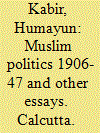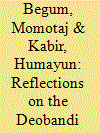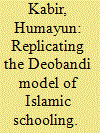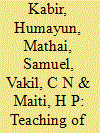|
|
|
Sort Order |
|
|
|
Items / Page
|
|
|
|
|
|
|
| Srl | Item |
| 1 |
ID:
033233


|
|
|
|
|
| Publication |
Calcutta, FIrma K.L.Mukhopadhyay, 1969.
|
| Description |
ix,133p.
|
|
|
|
|
|
|
|
|
|
|
|
Copies: C:1/I:0,R:0,Q:0
Circulation
| Accession# | Call# | Current Location | Status | Policy | Location |
| 002471 | 322.10954/KAB 002471 | Main | On Shelf | General | |
|
|
|
|
| 2 |
ID:
114015


|
|
|
|
|
| Publication |
2012.
|
| Summary/Abstract |
During the British Raj, as part of an effort to reform the Muslim community through religious regeneration and in the absence of Muslim political power on the subcontinent, Islamic scholars (ulema) from the Darul Uloom Deoband seminary urged the setting up of separate institutions of religious education for Muslim women. The reformist discourse of the Deobandi ulema had, and still has, a profound influence on the pedagogy of madrasah education for women in South Asia, including Bangladesh. This study examines how Deobandi reformist ideals continue to be reflected in a non-government female madrasah in Bangladesh. The study provides an ethnographic account which illustrates the development of a sense of Muslim womanhood, rooted in ideas of moral guidance and the pious lifestyles of the female students of the madrasah. Madrasah education increases Muslim women's participation in religious institutions and forums, thereby heightening the possibility of a broader impact on religious life. Although madrasah education empowers female students to improve their religious consciousness, it has less impact on patriarchal ideology, which is deeply embedded in Bangladeshi society and culture.
|
|
|
|
|
|
|
|
|
|
|
|
|
|
|
|
| 3 |
ID:
092247


|
|
|
|
|
| Publication |
2009.
|
| Summary/Abstract |
The proliferation of the Deobandi model of religious school has been taken for granted in South Asia, although how its pedagogic method and theological stances are being replicated in Bangladesh has received little academic attention. This paper delves into the replication of the Deobandi model of religious schooling in Bangladesh by describing the replication process in a local Quomi madrasa, which received strong patronage from Deoband at the height of the Islamic revivalist-reformist movements in South Asia. This study reveals that localized versions of Deobandi madrasas in Bangladesh are concerned with the 'other' Muslims, that is, Muslims with doctrinal views differing from the Deobandi school of thought. The contestation between the Deobandi interpretation of Islam and the other interpretive Islamic groups within the circle of madrasas suggests that Muslim identity is a matter of contention, with differing points of view from one type of madrasa to another and from one group of ulama to another.
|
|
|
|
|
|
|
|
|
|
|
|
|
|
|
|
| 4 |
ID:
029372


|
|
|
|
|
| Publication |
DelhI, Universal Publication, 1968.
|
| Description |
727p.
|
|
|
|
|
|
|
|
|
|
|
|
Copies: C:1/I:0,R:0,Q:0
Circulation
| Accession# | Call# | Current Location | Status | Policy | Location |
| 000980 | 300.7/KAB 000980 | Main | On Shelf | General | |
|
|
|
|
|
|
|
|
|